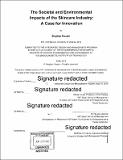The societal and environmental impacts of the skincare industry : a case for innovation
Author(s)
Maupin, Meghan
DownloadFull printable version (5.034Mb)
Other Contributors
Massachusetts Institute of Technology. Integrated Design and Management Program.
Advisor
William Aulet and Kit Hickey.
Terms of use
Metadata
Show full item recordAbstract
The $17 billion U.S. skincare industry negatively impacts women's health. It sets unrealistic beauty standards and ideals that are meant to influence consumers' product choices. Skincare products are unevenly regulated, and many formulations contain chemicals that harm individuals' health and end up in toxic landfills and watersheds. Skincare companies offer products with ingredients that are not verified or tested for safety or efficacy. Additionally, skincare products have historically been created for fictional archetypes, and insufficient attention has been paid to consumer's unique and changing skin needs. The short-term and long-term health outcomes resulting from skincare product usage affect divergent populations differently, due to the behavioral differences between women of different ages, ethnicities, and geographic locations, as well as other demographic and psychographic factors. This thesis examines these factors and looks beneath the skin of the industry, challenging the current modus operandi of its players. Using data mining techniques, the correlation between these factors are identified and used to predict skincare product waste. Unsupervised learning is used to group skincare consumers by their consumption behavior, as opposed to their demographics. A diverse sample of skincare consumers was chosen to score the skincare products in their everyday routine with both an individual health and environmental safety score. One solution supported by the research is innovation and new companies that are focused on customer education, ingredient transparency, and the measurement of individual safety outcomes resulting from skincare product usage.
Description
Thesis: S.M. in Engineering and Management, Massachusetts Institute of Technology, System Design and Management Program, 2018. "June 2018." Cataloged from PDF version of thesis. Includes bibliographical references.
Date issued
2018Department
Massachusetts Institute of Technology. Engineering and Management Program; Massachusetts Institute of Technology. Integrated Design and Management Program.Publisher
Massachusetts Institute of Technology
Keywords
Engineering and Management Program., Integrated Design and Management Program.